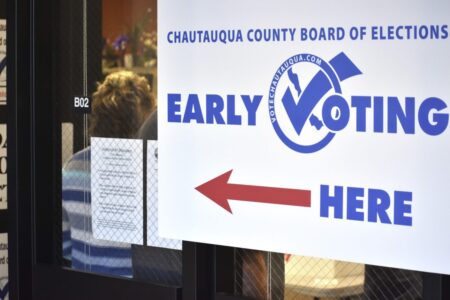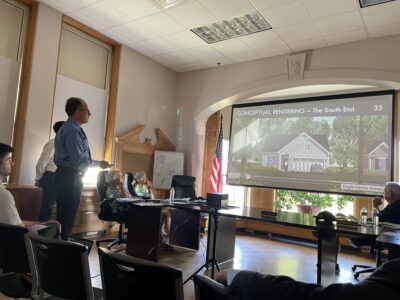Chautauqua Institution begins financial restructuring

Kyle Keogh, interim Chautauqua Institution CEO, is pictured.
Chautauqua Institution has announced a reorganization that affects more than 30 staff positions.
Some of the staff changes involve changes in a position’s role and some have been eliminated. Several positions eliminated were either already vacant or voluntarily vacated via retirement or resignation.
The changes included adjustments to staffing and operational budgets, aimed at increasing efficiency and fostering a more collaborative, cross-functional approach to work.
Institution officials said the decisions were made with deep consideration, guided by the Financial Sustainability Working Group of the institution’s board and senior leadership.
Earlier this summer, The Post-Journal reported on discussions between institution officials and the Chautauqua Institution community that the institution needs to improve net operating performance by between $4 million to $6 million, or roughly 13% of the institution’s budget, starting in 2026. The changes announced this week are part of that effort.
“We calculated that we needed to do about a 20 % cut to make sure that our expenses were less than our revenues next year. This is hard. It’s a significant amount,” said Kyle Keogh, interim Chautauqua Institution CEO. “But as we went through to make these changes, we really focused in on making sure that we can deliver an incredible 2026 season, both programmatically and an incredible experience for everyone that we can build from for the future.”
Over the summer Keogh and the institution’s board led a comprehensive review of the institution’s financial outlook and operational priorities, initiated in response to evolving attendance patterns and rising costs. While Chautauqua has experienced steady growth since 2020, recent trends have underscored the need to align expenditures with realistic revenue projections. Attendance in 2019 was 145,475, counted in gate passes other than season-long passes, while 2025 is forecast at 125,000 gate passes. The 2026 budget assumes the same attendance as 2025 rather than assuming any increase.
According to information discussed over the summer by Chautauqua officials, restructuring efforts were focused on three main areas: year-round personnel, operations and programming. Year-round personnel expenses were expected to decrease between $2.5 million and $3 million due to retirements, unfilled positions and staff reductions and area reorganizations. Keogh and the institution’s administrative team are looking to consolidate operations including restructuring retail operations and integrating youth, family and recreation activities. Changes to year-round personnel will include an eye toward keeping things that patrons have said improved their experience at Chautauqua, as well as considering risks with staff cuts and philanthropic opportunities.
Another $1 million to $1.5 million in savings are eyed through non-direct program related expense cuts and savings by reducing staff housing costs, eliminating the Grounds Access Pass, rethinking or eliminating enterprise activities, achieving a break-even status on several activities, closing the Washington, D.C., office and improving hotel financial performance. This will include prioritizing philanthropy aimed at rehabilitating the historic Athenaeum Hotel and identifying solutions to problems with staff housing.
Institution officials said the cost of on-grounds housing per night has increased from $107.05 in 2019 to $193.87 in 2025. The cost of on-grounds housing for staff was $262,983 in 2019 and increased to $899,060 in 2025 compared with $289,875 for staff living outside of the institution in 2019 and $299,050 in 2025. At the same time, on-grounds housing has increased over the past six years.
A final $1 million in savings is eyed in programming by modifications within the institution’s “Four Pillars’ and investments aligned with demand and philanthropic funding. That includes reducing investments in targeted areas and soliciting additional endowment and annual philanthropy. This includes attempting to preserve core activities that are part of the summer assembly while considering setting fundraising targets by program for a combination of annual funding and endowment funding to create resilient long-term programs.
Based on the 2024 Chautauqua General Survey, the 10:45 a.m. Chautauqua Lecture Series is the most enjoyed aspect of the Chautauqua program (22%) followed by Chautauqua Symphony Orchestra performances (15%), the sense of community (13.9%), morning worship (8.1%), interfaith lectures at 2 p.m. weekday afternoons (5.5%), popular entertainment concerts (5.2%) and Chautauqua Theater Company performances (4.9%). Survey results are one aspect of institution officials’ decision making process as they try to balance the institution’s yearly budget.
“This again is a reset moment to get us back. It’s a financial reset, not a relevance reset,” Keogh said. “We think Chautauqua is more relevant than it’s ever been in the past. We are multi -generational and we look at the world from multiple views. We integrate across the arts, education, recreation, religion, and we think that’s actually tremendously valuable now and for the next 20 years. So this is a financial change, not a programming change. And we are confident that we can deliver a great program next summer and beyond, and even be more relevant than we are today.”





